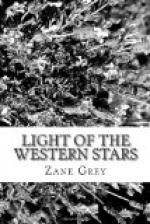After the one look at her when she had first put aside her veil he had not raised his eyes to her face. The cool audacity had vanished in what was either excessive emotion or the maudlin condition peculiar to some men when drunk. He could not stand still; perspiration collected in beads upon his forehead; he kept wiping his face with his scarf, and he breathed like a man after violent exertions.
“You see—I was pretty—” he began.
“Explanations are not necessary,” she interrupted. “I am very tired—distressed. The hour is late. Have you the slightest idea what it means to be a gentleman?”
His bronzed face burned to a flaming crimson.
“Is my brother here—in town to-night?” Madeline went on.
“No. He’s at his ranch.”
“But I wired him.”
“Like as not the message is over in his box at the P.O. He’ll be in town to-morrow. He’s shipping cattle for Stillwell.”
“Meanwhile I must go to a hotel. Will you please—”
If he heard her last words he showed no evidence of it. A noise outside had attracted his attention. Madeline listened. Low voices of men, the softer liquid tones of a woman, drifted in through the open door. They spoke in Spanish, and the voices grew louder. Evidently the speakers were approaching the station. Footsteps crunching on gravel attested to this, and quicker steps, coming with deep tones of men in anger, told of a quarrel. Then the woman’s voice, hurried and broken, rising higher, was eloquent of vain appeal.
The cowboy’s demeanor startled Madeline into anticipation of something dreadful. She was not deceived. From outside came the sound of a scuffle—a muffled shot, a groan, the thud of a falling body, a woman’s low cry, and footsteps padding away in rapid retreat.
Madeline Hammond leaned weakly back in her seat, cold and sick, and for a moment her ears throbbed to the tramp of the dancers across the way and the rhythm of the cheap music. Then into the open door-place flashed a girl’s tragic face, lighted by dark eyes and framed by dusky hair. The girl reached a slim brown hand round the side of the door and held on as if to support herself. A long black scarf accentuated her gaudy attire.
“Senor—Gene!” she exclaimed; and breathless glad recognition made a sudden break in her terror.
“Bonita!” The cowboy leaped to her. “Girl! Are you hurt?”
“No, Senor.”
He took hold of her. “I heard—somebody got shot. Was it Danny?”
“No, Senor.”
“Did Danny do the shooting? Tell me, girl.”
“No, Senor.”
“I’m sure glad. I thought Danny was mixed up in that. He had Stillwell’s money for the boys—I was afraid. . . . Say, Bonita, but you’ll get in trouble. Who was with you? What did you do?”
“Senor Gene—they Don Carlos vaqueros—they quarrel over me. I only dance a leetle, smile a leetle, and they quarrel. I beg they be good—watch out for Sheriff Hawe . . . and now Sheriff Hawe put me in jail. I so frighten; he try make leetle love to Bonita once, and now he hate me like he hate Senor Gene.”




